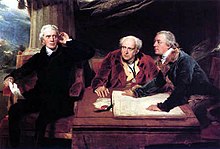Sir Francis Baring, 1st Baronet
| Sir Francis Baring, Bt | |
|---|---|

Sir Francis Baring (left), with brother John Baring and son-in-law Charles Wall, in a painting by Sir Thomas Lawrence
|
|
| Born |
18 April 1740 Larkbeare House, near Exeter |
| Died | 11 September 1810 (aged 70) Lee, London |
| Nationality | English |
| Occupation | Banker |
| Spouse(s) | Harriet Herring (m. 1767–1804) |
Sir Francis Baring, 1st Baronet (18 April 1740 – 11 September 1810) was an English merchant banker, a member of the Baring family, later becoming the first of the Baring baronets.
He was born at Larkbeare House near Exeter, son of John Baring (1697–1748) and his wife, Elizabeth Baring née Vowler (1702–1766), daughter of a prosperous Exeter dry goods wholesaler (at that time called a grocer). In 1762, Francis Baring, in partnership with his brother John, established the London merchant house of John and Francis Baring Company, which by 1807 had evolved into Baring Brothers & Co.. Despite being partially deaf from an early age, Francis did very well and, by the mid-1790s, had the full confidence of the British Parliament.
Baring's father emigrated from Bremen, Germany in 1717 and settled at Exeter, where he became a leading wool manufacturer and textile merchant. His premature death in 1748 resulted in Francis, aged eight, being brought up and strongly influenced by his mother, Elizabeth. Her sound business head nearly doubled the family's worth by the time of her death in 1766.
In the early 1750s, Francis was sent to London for education at Mr Fargue's French school at Hoxton and then at Mr Fuller's academy in Lothbury. Samuel Touchet, one of the leading Manchester and West Indian merchants in London, accepted him in 1755 for a seven-year apprenticeship, charging his mother £800. Upon his release on Christmas Day 1762, he joined his two surviving brothers in the interlocking partnerships of John and Francis Baring & Co. of London and John and Charles Baring & Co. of Exeter. Francis led the London concern and Charles the Exeter one, while John, a leading Exeter citizen and a Member of Parliament from 1776, was mainly a silent partner, although nominally senior partner of both firms.
...
Wikipedia
